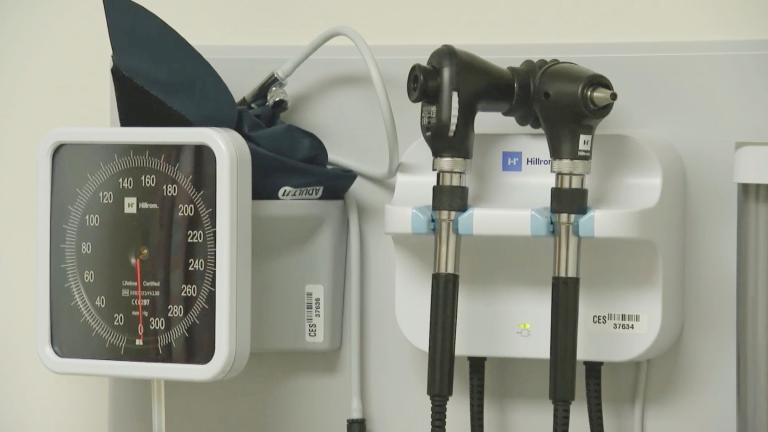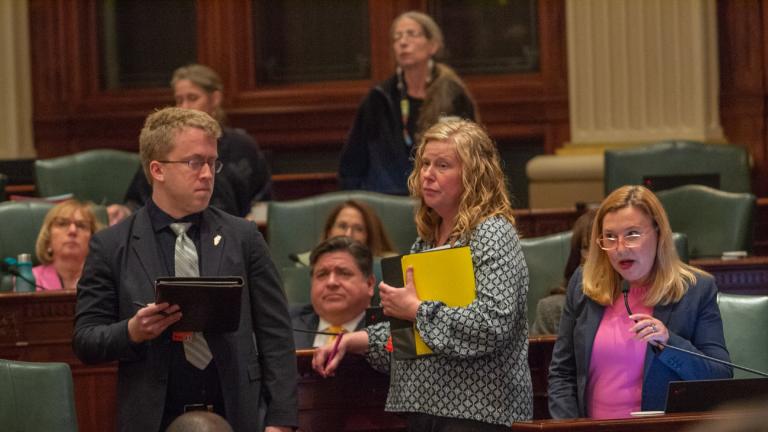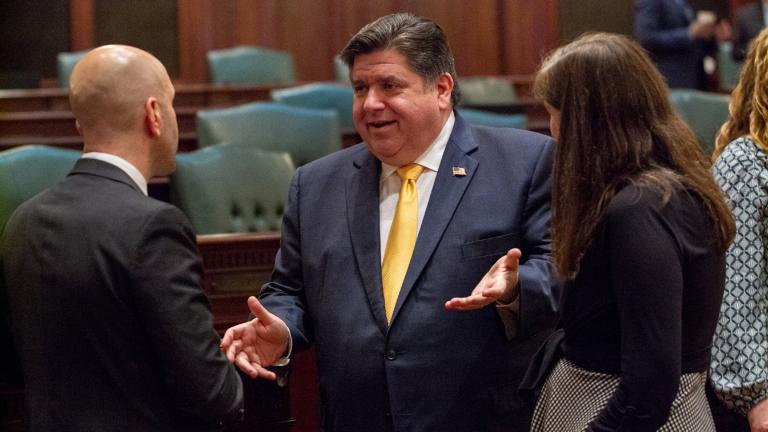Within hours of Illinois’ female state senators announcing their informal tribe will operate as an official, bipartisan caucus devoted to advancing legislation to empower women, the chamber killed a measure seeking to close a gap in gender pay equity.
The measure, House Bill 2462, would have prohibited prospective employers from asking job applicants’ wage histories, but Gov. Bruce Rauner rejected it, saying in his veto message that while he supports wage equality, the General Assembly should have modeled its legislation on a Massachusetts plan that calls, in part, for companies to conduct self-evaluations of their compensation systems.
The Senate’s attempt to override Rauner’s veto Thursday failed by a margin of 29-17, meaning that support for it dwindled from the time it first passed in May, on a vote of 35-18. The Illinois House, which is typically thought of as the less-liberal chamber, had voted 80-33 in October in favor of an override.
Sponsor Sen. Daniel Biss, D-Evanston, says women on average make 80 cents for every dollar men make, a gap in pay that follows a worker from job to job.
“My purpose is to close the persistent and pernicious gender pay equity gap that exits to a staggering and appalling extent here in 2017,” said Biss, who is running for governor.
Sen. Toi Hutchinson, D-Olympia Fields, says that gap is wider still for women of color, who are stuck in low-wage jobs.
“And there’s no way to jump through that barrier, because every further—every continuous job after that, is based on the last salary you had. It’s a very quiet way to make sure that your income levels don’t grow. It’s a very insidious way to make sure that that web is harder and harder every single year to penetrate,” Hutchinson said. “This is an economic issue. This is a community issue. This is not just a bill for women. It’s not. It’s how we can take care of our families over the course of our earning potential, over the course of our earning careers.”
Sen. Karen McConnaughay, R-Carol Stream, says it was with that mindset that she voted for the legislation originally. But she voted to leave Rauner’s veto in place after hearing from women business owners, who said that the potential of having to pay $5,000 to $10,000 fines for violating the law could put them out of business.
Sen. Jil Tracy, R-Quincy, said that the restriction would be yet another burden, “just one more death killer,” for Illinois businesses.
“It seems to me the best way we can close any perceived gender gap of payment is to encourage job growth and our economy and our employers and that’s where we’re failing,” Tracy said.
Earlier, Hutchinson, McConnaughay, Tracy and the other female Senators stood together to announce the formation of the Illinois State Senate Women’s Caucus.
The Senators say they often collaborate—inside the capitol and out—on policy matters, and given the widespread attention in recent weeks to a culture of sexual harassment in Springfield, it was time to formalize that practice.
“Women need to step up to the plate,” Sen. Melinda Bush, D-Grayslake, said. “There’s the saying ‘when you know better, you do better.’ And I think that with what’s come forward over the last couple of weeks, we all felt like we need to step up, making it clear that women work together. We intend to work together. We intend to do it more publicly, I believe. We’ve done it, as you’ve heard. We do it in each other’s apartments. We reach out.”
Groups of female legislators often met privately during Illinois’ budget impasse, and produced a framework that was seen as a viable path toward breaking the bipartisan gridlock.
While it took many more months for a budget agreement to be worked out, elements of that framework were part of it and helped to move leader-level negotiations along.
Sen. Kim Lightford, D-Maywood, said that although the women weren’t “visible” they know they played a role.
“The style of women is very different—we don’t have to have the pissing contest. We do our job. We do it well. And we like to move the ball without always having to get the credit, you know, so we know we drafted everything that’s happened recently and we know that we’re the reason why we moved the ball,” Lightford said.
Illinois has lost some of its high-profile female leaders: Senate Republican Leader Christine Radogno, the first woman to reach the role of a partisan caucus chamber leader, resigned in June, just before the budget; the first woman to become House majority leader, Barbara Flynn Currie, who was first elected to the Illinois House in 1978, isn’t running for reelection; nor is Illinois’ first female attorney general, Lisa Madigan, going to be on the 2018 ballot.
“I think it’s important … that they know that women like to be replaced with women. Just because a leadership position comes open don’t mean they put another guy in there. That’s more of the issue,” Lightford said. “We’re a lot of dynamic women, very seasoned, great ideas. I think we get skipped over often in this environment. So hopefully this caucus can stand together and encourage our leadership to appoint more women in leadership positions as they become available.”
The members of the Women’s Caucus say their first effort will be to ensure the effectiveness of a newly formed Senate task force on sexual harassment. Additional policy initiatives will be forthcoming, they said.
Follow Amanda Vinicky on Twitter: @AmandaVinicky
Related stories:
 Sexual Harassment Training Begins in Springfield
Sexual Harassment Training Begins in Springfield
Nov. 8: It’s not mandatory by law yet, but Illinois legislators began formal lessons Wednesday on how to conduct themselves without “unwelcome” behavior and contacts that could be perceived by victims as sexual harassment.
 Lawmakers Pass Measures Cracking Down on Sexual Harassment
Lawmakers Pass Measures Cracking Down on Sexual Harassment
Nov. 7: Sexual harassment has been part of the way of life at the Illinois state capital for decades. Lawmakers on Tuesday spent much of the day decrying that culture and approving measures intended to root it out.
 State Lawmakers Scramble to Tackle Charges of Sexual Harassment
State Lawmakers Scramble to Tackle Charges of Sexual Harassment
Nov. 6: Legislators return to Springfield on Tuesday for the second half of the annual veto session. Front and center: What’s being done in the capital about sexual harassment.








